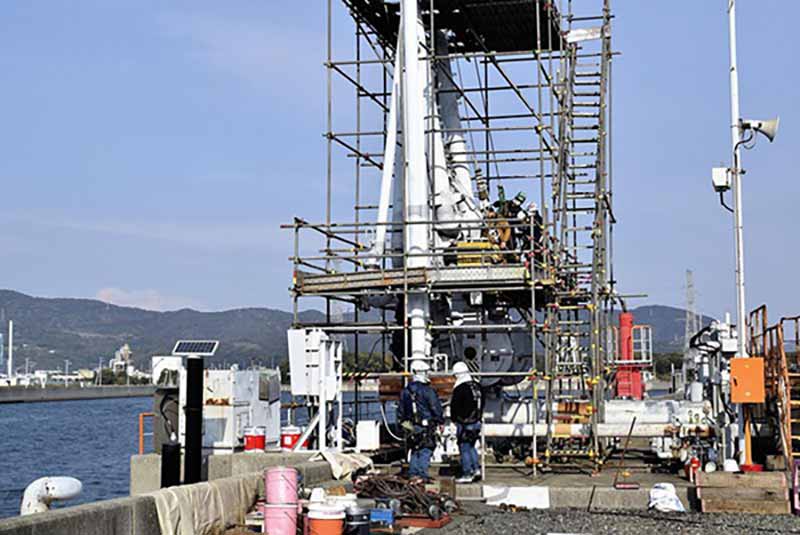
Workers test a piping system for heavy oil and crude oil at Kansai Electric Power Co.’s Ako Power Plant in Ako, Hyogo Prefecture, on Nov. 16.
November 28, 2021
OSAKA — Electric power companies are becoming increasingly alarmed at the growing demand for heating ahead of the heart of winter, especially in the Kansai region, which was on the verge of a blackout in January due to power shortages.
In mid-November, about 10 workers were inspecting a piping system at Kansai Electric Power Co.’s Ako Power Station, which is located along the coast in Ako, Hyogo Prefecture.
The team was using nitrogen gas to check for leaks when unloading heavy oil and crude oil from a ship. The company said the check was done as part of preparations for winter, when demand for electricity increases.
Ako Power Station, an oil-fired thermal power plant, has a combined output of 1.2 million kilowatts for units 1 and 2, an amount equivalent to that of a nuclear power reactor.
However, the plant is operational for less than half of the year because it is unprofitable. The cost of generating electricity is more than twice that of nuclear or liquefied natural gas-fired plants.
While oil-fired power plants are being phased out across the country, Kansai Electric Power Co., or KEPCO, has no choice but to keep the plant because operations at some of the company’s reactors are still suspended.
“It serves as a substitute when things are tight,” said an employee in charge of maintenance of the boiler.
Increasing supply capacity
The tight electricity situation earlier this year was brought about by fuel shortages. Heating demand increased sharply due to strong cold fronts. The increased demand caused a shortage of LNG, which forced KEPCO to cut thermal power generation output at LNG-fired plants.
In Kansai, the situation resulted in the electricity system’s usage rate — the proportion of demand against supply — to hit 99%.
Thermal power generation accounts for nearly 70% of the total power generation in Japan.
The prospect is somber for this winter based on figures released in October by the Organization for Cross-regional Coordination of Transmission Operators, Japan.
The report estimated that if this winter is the coldest in the past 10 years, the power supply reserve rate, which indicates excess supply capacity against demand, would be 3.9% in Kansai and 3.1% in the Tokyo metropolitan area. The minimum line for a stable supply is considered to be 3%.
These figures are the result of efforts that power companies have already made to increase supply capacity.
KEPCO had hoped to restart the No. 3 reactor at the Oi nuclear power plant in Fukui Prefecture, but the reactor’s periodical inspection has been postponed from this winter to next summer.
Work to address the LNG shortage continues. According to the Economy, Trade and Industry Ministry, major electric power companies had 2.3 million tons of LNG in stock in October, 700,000 tons more than a year ago. Nonetheless, the industry remains wary.
“There’s a possibility of a crisis happening due to unexpected events, including glitches occurring at power plants and weather abnormalities,” an official at a major power company said.
Battle for LNG
As the decarbonization movement spreads around the world, the headwinds to thermal power generation are growing stronger.
The future of LNG-fired power plants, which emit relatively little carbon dioxide, also looks bleak. The price of LNG may rise in the medium to long term as a result of competition with China, which is expected to import the largest amount of LNG in the world this year.
Against this backdrop, the search for ways to utilize nuclear power plants continues. It is said that 25 reactors are needed to achieve the goals in the Basic Energy Plan approved by the government in October, but only seven are currently operating.
Solar power generation, which in the plan is expected to increase, is unlikely to fill the gap during stormy winter weather.
“Coal-fired power is essential for Japan for the time being,” said Kazuhiro Ikebe, chairman of the Federation of Electric Power Companies of Japan. Ikebe, who is also president of Kyushu Electric Power Co., indicated that the supply and demand for electricity will be tight this winter and the next summer and winter.
“The problem is a lack of movement to build more LNG-fired power plants,” Ikebe said.
Top Articles in Business
-

Prudential Life Insurance Plans to Fully Compensate for Damages Caused by Fraudulent Actions Without Waiting for Third-Party Committee Review
-

Narita Airport, Startup in Japan Demonstrate Machine to Compress Clothes for Tourists to Prevent People from Abandoning Suitcases
-

Japan, U.S. Name 3 Inaugural Investment Projects; Reached Agreement After Considerable Difficulty
-

Toyota Motor Group Firm to Sell Clean Energy Greenhouses for Strawberries
-

SoftBank Launches AI Service for Call Centers That Converts Harsh Customer Voices into Softer Voices
JN ACCESS RANKING
-

Japan PM Takaichi’s Cabinet Resigns en Masse
-

Japan Institute to Use Domestic Commercial Optical Lattice Clock to Set Japan Standard Time
-

Israeli Ambassador to Japan Speaks about Japan’s Role in the Reconstruction of Gaza
-

Man Infected with Measles Reportedly Dined at Restaurant in Tokyo Station
-

Videos Plagiarized, Reposted with False Subtitles Claiming ‘Ryukyu Belongs to China’; Anti-China False Information Also Posted in Japan




















